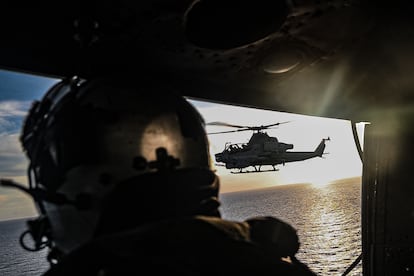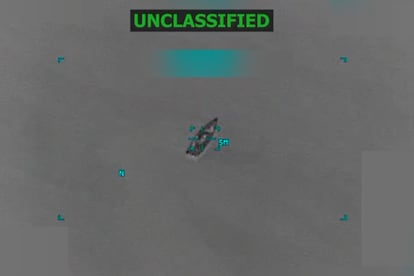Donald Trump has authorized the CIA to carry out covert actions inside Venezuela, the president himself has confirmed. The move, reported by The New York Times, comes as the US president increases pressure on the Andean country and President Nicolás Maduro with a campaign of attacks by his armed forces in international waters against boats he accuses of participating in drug trafficking.
"I authorized it... for two reasons," Trump stated during an Oval Office event on Wednesday. The Republican asserted that he made the decision because"Venezuela has emptied its prisons in the United States" and because "we have a lot of drugs coming from Venezuela. Many of them come by sea... we're also going to stop them on land." The US president had already indicated weeks ago that his strategy of attacks against drug boats was approaching a "second phase" that would include actions on land. Now he has asserted that Venezuela"is feeling the pressure."
The authorization would allow the CIA to carry out lethal operations inside Venezuela and a range of missions in Caribbean waters, the Times reports, citing senior US officials. The measure represents a new step in the US campaign against Venezuela and its regime, which Washington denounces as illegitimate and links to drug trafficking networks. This Tuesday, Trump announced on social media a new attack by the military vessels he has deployed in the Caribbean against a suspected drug boat, in an attack that left all six occupants of the vessel dead.

Since September 2, when the president announced the first attack, the United States has sunk at least five vessels in as many attacks, killing at least 27 people. Washington claims it needs this type of measure to protect national security. But experts and human rights organizations consider these attacks illegal and wonder why the United States doesn't simply intercept suspicious vessels and interrogate their crews, as it has traditionally done and continues to do on other drug trafficking routes. The U.S. Coast Guard, for example, operates near Ecuador on this type of mission.
Asked about the reason for this strategy, Trump replied that"we've been doing that (intercepting boats) for 30 years, and it's totally ineffective. They have very fast boats. Although not as fast as missiles."
The United States has not provided any details about the attacks. It has never identified the victims or specified what type of drugs the boats were carrying.
The State Department has doubled the reward for Maduro's capture to $50 million [about €43 million], accusing him of being one of the leaders of the Cartel of the Suns, and has included the Tren de Aragua criminal gang on the list of foreign terrorist organizations since February. The Pentagon has informed Congress that Trump believes the United States is engaged in an armed conflict against drug trafficking.

According to the Times, the new authorization would allow the CIA to carry out covert operations, either alone or in coordination with military forces, against Maduro or his government. The newspaper clarifies that it is unknown whether the CIA plans to carry out any type of operation inside Venezuela or if the permit was approved solely as a contingency measure.
The authorization comes as US forces are developing plans for a possible escalation. The options they are presenting to Trump include possible attacks inside Venezuela.
Earlier this month, Trump indicated that he was considering moving the current campaign of attacks against alleged drug boats to a second phase, without providing any details:"We'll see what that entails," he declared. At an event commemorating the 250th anniversary of the U.S. Navy at the Norfolk Naval Base, the largest in the world, the president had indicated that he was considering taking the operation against the cartels to land, a possibility he has already floated in various statements."It's not going to go so well for them (the drug traffickers) there either," he commented, without mentioning the serious international repercussions that such an action would likely have.
Currently, the United States maintains a fleet of eight warships—among them amphibious assault ships—and a nuclear submarine in international waters off Venezuela's territorial waters. These vessels carry more than 2,000 US military personnel, including Marines, Harrier aircraft, and F-35 fighter jets. Washington also maintains troops at bases in Puerto Rico.
"If you're in our hemisphere, if you're in the Caribbean, if you're north of Venezuela and you want to traffic drugs into the United States, you're a legitimate target for the U.S. military," Defense Secretary Pete Hegseth said of the deployment.
The president, who often boasts about the success of the campaign against the alleged drug boats, has also ordered the suspension of all diplomatic contacts with Venezuela, as the Times has also revealed. That decision came after Maduro tried to appease the United States with an offer to participate in the exploitation of the country's natural resources, including oil and other raw materials, according to the newspaper.
Maduro, for his part, believes that the argument of fighting drug trafficking barely conceals a desire to force regime change in Venezuela, either through pressure to resign or through actions to overthrow him.
The Venezuelan president, for his part, is mobilizing the Armed Forces for almost weekly military exercises, with the goal of being ready in case the United States opts for a coup within its territory. This deployment is especially visible in coastal areas. Meanwhile, Maduro maintains his agenda, in a gesture intended to demonstrate normalcy: he is inaugurating hospitals and has signed a state of emergency decree due to external shock. He has also received an honorary doctorate.
Amid these tensions, the awarding of the Nobel Peace Prize last Friday to Venezuelan opposition leader María Corina Machado adds to the pressure on the Chavista leader. In an interview with this newspaper after the award was announced, Machado stated:"We are facing the real possibility that Venezuela will truly liberate itself and move toward an orderly transition, because 90% of the population wants the same thing."
And he insisted: "Don't tell us this could be Libya, Afghanistan, or Iraq; this has nothing to do with it," he said, referring to other failed—and lengthy—US interventions abroad so far this century, which Trump has asserted he has no intention of imitating.

